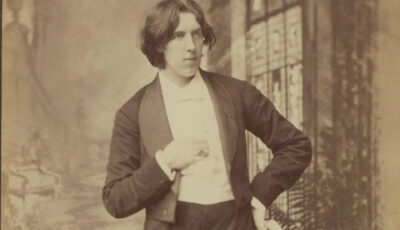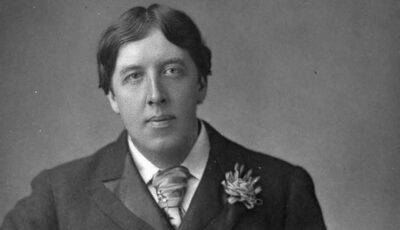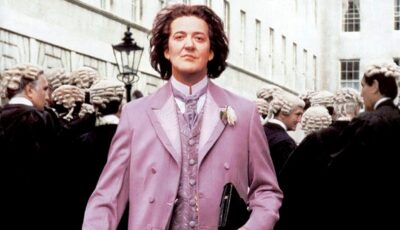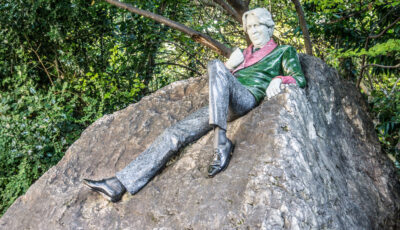Oscar Wilde (1854-1900) is one of the greatest names in Irish literature. His full name, Oscar Fingal O’Flahertie Wills Wilde, is a Dublin writer highly acclaimed the world over for his naturalistic writings. His influential works still seem timeless today. Unfortunately, he was later imprisoned in an English jail for homosexuality, and lived a life of success and decline until his death…

Oscar Wilde – Public domain
Oscar Wilde was born in Dublin in October 1854. The son of a surgeon (Sir William Robert Wills Wilde) and a nationalist poetess (Jane Francesca Elgee), he led a well-to-do life.
His youth was spent in a fascinating and intellectually brilliant family, which played a major role in awakening his imagination and creativity.
His father, William Wilde, was an eminent surgeon and ophthalmologist, as well as a scholar with a passion for Irish history and folklore. His mother, Jane Francesca Elgee, better known as Lady Wilde, was a poet and fervent Irish nationalist. She organized literary salons where artists and intellectuals met, an atmosphere that helped awaken young Oscar to literature and art.
From an early age, he was exposed to a world of stories, Celtic myths and intellectual debate.
Wilde grew up in a house filled with books, art and ideas. From an early age, he showed a pronounced taste for aesthetics, influenced by the refined decoration of his home and his mother’s convictions on beauty and art.

Oscar Wilde – Public domain
His schooling began at Portora Royal School in Enniskillen, where he excelled in literature and classical languages. It was here that he laid the foundations for his unique, flamboyant style, blending humor, provocation and intellectual depth.
After his time at Portora Royal School, Oscar Wilde continued his brilliant academic career at prestigious institutions that nurtured his mind and honed his literary style.
In 1871, he won a scholarship to Trinity College Dublin, one of Ireland’s most renowned universities. There, he studied Classics, excelled in the discipline and won numerous prizes, including the prestigious Berkeley Gold Medal for his knowledge of Greek.
His exceptional talent won him another scholarship to Magdalene College, Oxford, in 1874. There, Wilde deepened his interest in aesthetics, inspired in particular by the works of John Ruskin and Walter Pater, who advocated the primacy of beauty in art and life. He also developed his eccentric personality and sense of provocation, becoming famous for his scathing repartee and flamboyant style.
His rather precious attitudes, coupled with his excellent elocution, soon gave him a reputation as a dandy which he was unable to shake off…
At Oxford, he received honors for his brilliant essays, graduating with honors in 1878. His thesis, The Renaissance of English Poetry, was already a testament to his erudition and passion for aesthetics. This academic background provided him with a solid culture and an approach that was to mark all his future work.
Oscar Wilde discovers his homosexuality, and begins his first writing project
After his studies, Oscar Wilde moved to London, where he immersed himself in the cultural and social life of the Victorian capital. His exuberant personality and innate sense of style soon made him famous.
A bon vivant with a love of parties and beauty, he indulged in many excesses.
At the same time, he began lecturing on aesthetics, defending the idea that art exists for its own sake, without the need for morality or utility. His speeches attracted both admiration and criticism, but they never left anyone indifferent.
In 1881, he published his first collection of poems, simply entitled Poems. The book was well received, reinforcing his reputation as a promising young author.
Shortly afterwards, he embarked on a lecture tour of the United States, where he fascinated audiences with his charm, repartee and theatrical allure. Upon his arrival, he was quoted as saying, “I have nothing to declare, except my genius.” This phrase perfectly sums up his provocative spirit and his taste for spectacle.
Back in Europe, Wilde pursued his literary career and became editor of The Woman’s World magazine, where he championed avant-garde feminist causes. It was also during this period that he married Constance Lloyd in 1884. The couple had two sons, but despite this seemingly traditional family life, Wilde led a complex existence, marked by his relationships with men and his artistic exploration.
In 1890, Oscar Wilde achieved his first major success with his work “The Portrait of Dorian Gray”, which shocked Victorian society with its themes of immorality and hedonism, while establishing itself as a major work. He became a veritable literary figure in London and Parisian circles. So much so, in fact, that his reputation spread beyond Europe’s borders, bringing him considerable notoriety in the United States!
It was during this decade that he wrote his most famous plays, including L’Importance d’être Constant, which established his reputation once and for all.

Oscar Wilde – Public domain
Having achieved great popularity with his theatrical and literary works, Oscar Wilde’s life was turned upside down. In 1891, he met Lord Alfred Douglas, nicknamed “Bosie”, a young man from high society. Their passionate but tumultuous relationship soon became the center of his life. However, in Victorian England, their affair is illegal and scandalous, drawing the attention of society and Bosie’s family.
Bosie’s father, the Marquess of Queensberry, publicly accuses Wilde of being a “sodomite”. Outraged, Wilde decides to sue for libel. But the lawsuit backfires: Queensberry presents damning evidence of Wilde’s homosexuality. In 1895, Wilde was arrested, tried and sentenced to two years’ hard labor for “gross indecency”.
In prison, Wilde endured terrible conditions that affected his physical and mental health. Yet it was also a period of intense reflection. He writes De Profundis, a long letter to Bosie, in which he reflects on their relationship and explores themes of redemption, suffering and art.
Upon his release in 1897, Wilde was shattered. He left England for France, where he lived under the name of Sebastian Melmoth. He publishes The Ballad from Reading Gaol, inspired by his prison experience, which becomes one of his last masterpieces. Now ruined, ostracized and suffering from ill-health, he spent his last years in Paris, in anonymity and poverty.

Grave of Oscar Wilde – Frank Camp – cc
En France, près de Berneval, il
publishes the poem “The Ballad of Reading Gaol”, a work dedicated to the theme of imprisonment, in which a death row inmate expresses himself.
Wishing to remain anonymous, he named himself Sébastien Melmoth, and sank into degradation, abusing alcohol and drugs and leading a most depraved life.
His attitude alerted those around him, but they were unable to save him…
At the age of just 46, Oscar Wilde died in Paris on November 30, 1900, of meningitis (Wilde’s diagnosis of the disease is still widely disputed). Shortly before his death, Oscar Wilde is said to have uttered the now-famous words: “I am dying as I have lived, far beyond my means”.
His grave in the Père-Lachaise cemetery, adorned with a monument by Jacob Epstein, is today a place of pilgrimage for lovers of literature and art. It was customary for fans to pay their respects by kissing the grave with bright red lipstick… This practice has now been banned, in order to preserve the site.
After his death in 1900, Oscar Wilde’s posterity went through periods of silence, criticism, then rehabilitation and admiration. His works, his life and his spirit continue to influence literature, theater and even popular culture, making him an emblematic figure of genius and resistance in the face of social rigidity.
From the 1920s and 1930s, literary circles rediscovered the depth and irony of his writings. Writers such as T. S. Eliot and André Gide emphasized his literary genius and his ability to capture the essence of society. Reissues of his plays and the publication of De Profundis attracted new audiences.
In the second half of the XXᵉ century, Wilde became an icon of the LGBTQ+ community. His life, marked by a quest for freedom in an oppressive society, inspires militant movements. Official recognition of his homosexuality and the injustices he suffered gradually emerges, notably with his judicial rehabilitation in 2017 by the British government, which overturns his conviction.

Wilde movie poster
Adaptations of his works, films about his life (Wilde, with Stephen Fry, in 1997, for example) and critical essays have reinforced his place in the literary pantheon. His tomb, in the Père-Lachaise cemetery in Paris, has become a place of pilgrimage. The monument, marked by lipstick marks left by visitors over the decades, bears witness to the writer’s enduring affection.
Wilde’s aphorisms and plays remain timeless. Works such as The Importance of Being Earnest and The Portrait of Dorian Gray are regularly studied and performed, celebrating his talent for exposing social hypocrisies with elegance and bite.
Wilde is now celebrated as a precursor of modern thought. His free spirit, humor and social critique make him a figure who transcends his era, inspiring those who seek to challenge norms and embrace their singularity.
Oscar Wilde, who proclaimed: “Art is the most intense form of individualism the world has ever known“, lives on through his works and his lasting impact on cultural history.

Statue of Oscar Wilde in Merrion Street, Dublin – William Murphy – cc
Oscar Wilde has an unshakeable bond with Ireland. Although he moved to England to pursue his studies at Oxford, his mind remained imbued with the Irish legends and folklore passed down by his mother.
Some of his works, such as his children’s stories (The Canterville Ghost, The Happy Prince), reveal a sensibility imbued with the melancholy and romanticism typical of traditional Irish storytelling.
After his exile and death in 1900, Ireland paid tribute to his literary genius. Dublin retains several monuments in his honor, including a statue in Merrion Square, near his birthplace.
Today, Wilde is considered one of Ireland’s great cultural figures, a symbol of the Irish spirit: brilliant, satirical and deeply human.